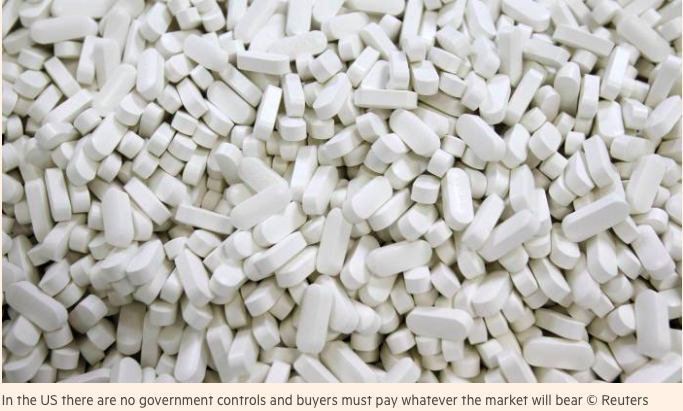Hikma hikes price of US medicines by up to 430% by the Financial Times

Increases mark latest incidence of pharma ‘gouging’.
Hikma, the London-listed generic drugmaker, has sharply increased the price of a string of medicines in the US — including a diarrhoea treatment that has risen 430 per cent — in the latest instance of “gouging”.
West-Ward Pharmaceuticals, the US division of Hikma, raised the price of six of its drugs at the start of the month by between 75 per cent and 430 per cent, according to figures seen by the Financial Times. The mean increase was 237 per cent.
The average wholesale price of a 60ml bottle of liquid Atropine-Diphenoxylate, a common diarrhoea drug better-known by the old brand name Lomotil, went from about $16 a bottle to $84 — meaning a single dose of the 35-year-old medicine now works out at $14.
Since 2004, the price of the product has gone up nearly ten-fold.
The increases show how generic drugmakers are able to command high prices on products where they have a monopoly or face little competition, even as the industry struggles to cope with a period of deflation that is squeezing margins.
In the US there are no government controls and buyers must pay whatever the market will bear.
Of the six drugs, West-Ward is either the only supplier of the products in the US or one of two manufacturers.
Brian Hoffmann, president of US generics at West-Ward, said the price of 94 per cent of the group’s copycat medicine portfolio had either fallen or stayed the same in 2017, and that prices had fallen overall this year.
Mr Hoffmann said the company had made “price adjustments” on a “small number of products [that] required investment . . . to become commercially viable”. The investments included extra manufacturing capacity and finding new suppliers of “active pharmaceutical ingredient” — the chemical that gives a drug its clinical benefit, he said.
Michael Rea, chief executive of Rx Savings Solutions, which makes software to help patients and employers cut their drug expenses said: “In a challenging economic environment, manufacturers of generic drugs are forced to pull strings on the products they maintain leverage on. Unfortunately, consumers and employers are the ones paying the price.”
All but one of the six Hikma products are liquid versions of drugs that tend to be available at a much lower price in the form of a tablet, where the market is more competitive.
For instance, West-Ward charges 19 cents for a 5mg tablet of Prednisone, a type of steroid used to treat inflammatory conditions such as asthma and arthritis, but $4 for the equivalent dose in liquid form.
It is the sole supplier of the liquid version, but in the tablet market it faces competition from several rivals, including Perrigo, the large Ireland-based generic drugmaker.
The US market for Prednisone, which was approved for human use in the 1950s, was worth about $278m last year, according to QuintilesIMS, the data provider.
Liquid formulations tend to be prescribed for patients who have problems swallowing pills, such as young children or the elderly, or in settings where people try to hide that they have not taken their medication, such as psychiatric hospitals.
David Gortler, a former official at the US Food and Drug Administration, said he would expect liquid formulations — which often come in glass bottles — to be slightly more expensive but said they “should not cost that much more”.
The suggestion that the active pharmaceutical ingredient in the liquid was more expensive than the pill was “nonsense”, added Mr Gortler, who now lectures in pharmacology at Georgetown University.
Historically, the price differential has been much lower: in 2004, a 5mg pill of Prednisone was 12 cents while the equivalent in liquid form was 14 cents.

More more articles like this follow @jessethan!
